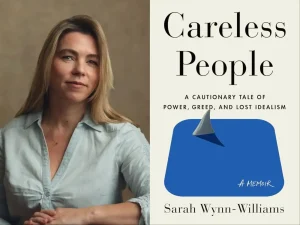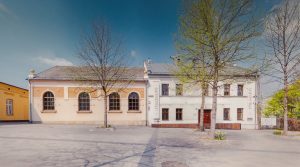University of Manitoba professor Haskel Greenfield is expressing outrage about an exhibit at the Canadian Museum for Human Rights that highlights, among others, the story of Izzeldin Abuelaish, a Palestinian doctor from Gaza who lost three daughters and a niece when an Israeli missile hit his home during Operation Cast Lead in 2009.
In Greenfield’s words, the interactive exhibit that includes Abuelaish is “a disgusting, one-sided portrayal of a complex situation. It completely ignored the fact that Hamas used yards and roofs of residences, schools and hospitals to launch their missiles. The Palestinian family portrayed was a tragic example of collateral damage in a war started by their Hamas government.”
Greenfield, a world-renowned archeologist and acting head of U of M’s Judaic studies program, added that the individual explaining the exhibit to visitors showed “a total lack of knowledge of the incident and the larger context.”

He said it’s “very clear to me that the exhibit is not about human rights at all. It is an opportunity for Israel bashing and subtle anti-Semitism. The exhibit only focuses on what the Israelis have done to Palestinians – and, in particular to one Palestinian family – without any context as to why it happened.”
The fifth-floor Rights Today gallery, one of 10 “core galleries” at the museum, opened in November 2014. A few of the other individuals profiled are Canadian folk singer Buffy Sainte-Marie and children’s rights advocate Craig Kielburger. Museum spokesperson Maureen Fitzhenry said the exhibit is changed when its steering committee or researcher co-ordinator feels there’s a need and resources allow.
READ: MP DENIES ALLEGATIONS HE SUPPORTS ANTI-ISRAEL VIEWS
Abuelaish, who is now an associate professor of global health at the University of Toronto, is scheduled to speak at the museum on April 20.
During the years that the Canadian Museum for Human Rights in Winnipeg was under construction, there was concern expressed that it would focus too much on the Holocaust. There were also concerns raised that Aboriginal issues wouldn’t receive enough attention.
Greenfield’s complaint is the first time the museum has come under criticism since it opened in September 2014, and the first time it has been taken to task for an exhibit connected to the Israeli-Palestinian conflict, although at the official opening, a small group of Palestinians demonstrated against the facility.
Fitzhenry said Abuelaish’s story is one of 17 profiles of a number of human rights defenders with diverse backgrounds that are currently being featured in the Rights Today gallery. “This particular exhibit… is intended to show how the challenge of defending and promoting human rights around the world involves many people, including Canadians, working in many different fields.”
She noted that Abuelaish was born and raised in a refugee camp and grew up in dire poverty, but still managed to become a highly educated doctor who uses health care as way to promote human rights.
“He is also committed to helping women in the Middle East access post-secondary education, through a foundation he established after the death of his daughters,” Fitzhenry said.
“His personal tragedy… is only one aspect of his story. Despite this tragic event, he refuses to hate. Instead he works for peace, understanding and reconciliation. He believes that if we treat each other with decency and respect, if we refuse to take sides, if we claim responsibility for our actions, then getting past the ugliness of war and conflict is possible. His story illustrates one way that an individual can take positive action for human rights.”
She added that Abuelaish’s “story is relayed in a factual and non-judgmental fashion. It’s not focused on who was to blame for the death of the children, but explores how his personal experiences – including this tragic event – shaped the human rights work he does today.”
READ: IRWIN COTLER LINKS PURSUIT OF JUSTICE AND JEWISH VALUES
The point, Fitzhenry said, is to tell his personal story and what has shaped his work as a human rights defender, not probe the causes of the Arab-Israeli conflict. “Our aim is to explore Dr. Abuelaish’s journey, demonstrate his ongoing commitment to peace, and encourage respectful discussion and dialogue.”
In a Globe and Mail article in the summer of 2014, Abuelaish accused Israel of waging war against women and children, and practising genocide. “Battles should be directed against the occupation, which is the threat and enemy to all of us as Palestinians and Israelis,” he wrote.






